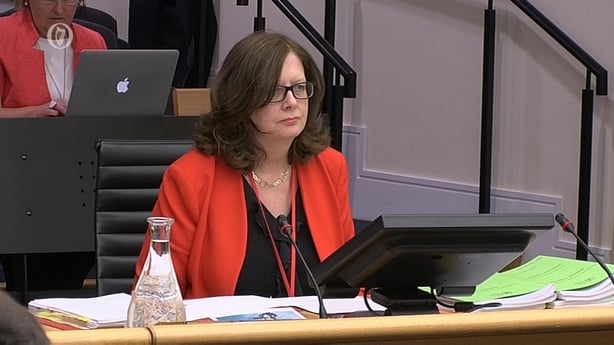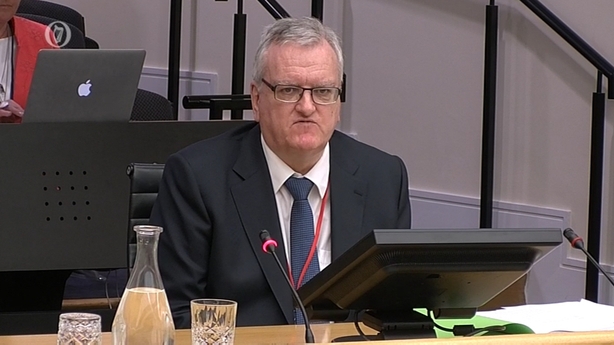The banking inquiry was suspended for 17 minutes this afternoon after former finance minister Charlie McCreevy refused to answer a question from Sinn Féin's Pearse Doherty on whether there had been a property bubble.
The committee met in private to discuss legal advice and on its return, chairman Ciarán Lynch reminded the witness he could face criminal sanctions or a finding of non-compliance if he did not answer.
He could also be recalled next week with a broader remit of questioning.
Mr Doherty then asked the question again and Mr McCreevy responded.
Prior to the suspension, Mr McCreevy had told the inquiry he did not believe there was any property bubble up to the time he left the finance portfolio in 2004.
When pressed by Mr Doherty on whether he believed a property bubble had ever developed in the last 15 years, he said he would only answer for his time in office.
Mr McCreevy said when he finished as EU Commissioner in February 2010 he made a vow not to comment on any aspect of public life and he has not since.
"I'm not going to breach that today," he told the inquiry.
Mr Doherty said he wanted Mr McCreevy to answer this question, because it would lead to further questions on whether he believed the tax incentives he introduced as finance minister contributed to a property bubble.
Pressed again, Mr McCreevy insisted he would not comment on issues beyond his time in finance.
Mr McCreevy said he would not apologise as he did not get anything wrong. He said he did a very good job.
He said he would not speculate on what came after.
Mr McCreevy defended housing policies during his tenure, saying all initiatives were to increase supply.
He said terrible devastation had been caused to Ireland by the financial crisis.
When asked about advice from the Central Bank during his tenure warning about the credit and housing markets, Mr McCreevy said he had looked back on Central Bank reports for over 30 years and they always contained various warnings.
Asked about advice from finance officials, the former minister said they put their case forcefully at the time and fought their corner, but in a democracy it was up to the minister of the day to make a decision.
He noted the current Government was ignoring the advice from the Fiscal Advisory Council.
Mr McCreevy said if Mr Doherty became finance minister and Joe Higgins became minister for public expenditure he had no doubt they would blindly ignore advice from officials.
He also he had "changed his mind" about ending the property tax relief scheme in 2002.
He was being questioned by Fine Gael TD Kieran O'Donnell who asked him why he announced in that year's budget that the scheme would end.
Mr McCreevy later announced that the schemes would be extended by a further two years.
Public finances were in 'exceptionally healthy state'
Earlier, he told the inquiry the policies he pursued were appropriate and prudent and the economy and the public finances were in an exceptionally healthy state when he left.
Mr McCreevy, who was minister from 1997 to 2004, defended his record and said there was no splurge over the period of "considerable economic success", when spending increased considerably in health, education and social welfare.
There were "substantial" exchequer surpluses every year and he said this was achieved after providing for a large public capital spending programme.
He said he set up the "rainy day" fund, the National Pensions Reserve Fund, while setting aside 1% of GNP annually for future liabilities.
Mr McCreevy said many people had suggested the government at the time should have spent less, to which he responded by asking: "Are these people for real?"
He said his department ran surpluses in a political democracy when many benefited. He added increasing the reserve fund further would have been politically unacceptable and morally wrong.
On tax incentives, he said they had been a feature of the Irish tax system for 50 years and many non-Fianna Fáil-led governments had also introduced them.
The former minister said his attitude to tax incentives was to improve equity in the tax system. He said he was a supporter of properly funded reliefs to encourage goods and services.
Asked about the huge rise in tax cuts and spending in the budget before the 2002 general election, Mr McCreevy said the government would have been very conscious of trying not to do something that would antagonise the electorate.
Mr McCreevy said he had no recollection of lobbying for a bank guarantee in May 2008, as the inquiry heard from Kevin Cardiff.
He added that joining the euro was in our overall best interests and he still believed that today.
He defended the splitting of responsibilities between the Financial Regulator and the Central Bank and he said he noted with a certain degree of irony that most of the politicians and commentators who wished to keep the Central Bank out of the key role at that time, were to the forefront in advocating the return of all powers to the Central Bank after the crash.
But he said he did not believe the structure of the authority was a major factor in the banking collapse and he said that during his time as minister, it was never contemplated that any Irish bank could fail.
Mr McCreevy also said that he does not believe decentralisation was a failure.
He sees many offices around the country and it has rejuvenated some areas, he said.
He said he was very sad that the total decentralisation project was not completed as he had envisaged.
Mr McCreevy said he announced the Special Savings Incentive Account (SSIA) scheme in 2001.
Asked by Senator Michael D'Arcy whether it was a ploy to win two elections, Mr McCreevy said: "I'm not that much of a genius."
Mr McCreevy said in certain areas, too much competition can be a bad thing.
He told the inquiry that competition between banks in Ireland contributed to the lessening of credit standards.
Earlier, a senior official in the Department of Finance told the inquiry that nationalising Anglo Irish Bank earlier would not have made a difference to the outcome.
Second Secretary General Ann Nolan said she did not believe that intervening by taking control of the bank before January 2009 would have changed events.

Ms Nolan also said new laws should prevent a recurrence of the situation where a small number of people can have large loans from many different institutions and pose a systemic risk.
She said a Credit Register to monitor lending is being set up by the Central Bank.
On recently published correspondence between herself and Governor Patrick Honohan about possible payouts for Anglo bondholders after the liquidation, Ms Nolan said there may not be money left over.
However, if there was, they would do everything in their power to avoid paying out but the moral argument might not hold sway.
Fine Gael TD Kieran O'Donnell asked why the government had put another €1.5bn of capital into Anglo Irish Bank one week before it was nationalised.
Ms Nolan said they were waiting for a due diligence report from Law Firm Arthur Cox and it was not ready before a European Commission deadline.
Ms Nolan dealt with the IFSC from 1998 to 2003. She rejected a description of the centre as the wild west of European finance and said the comparison was probably drawn from the low corporate tax rate.

A former senior department official told the inquiry it was a matter of regret for him that the country suffered from a period of recession and austerity in restoring the public finances.
Former second secretary general Donal McNally said, however, that the economy grew soundly for many years up to 2008 as did employment and wage levels.
Fine Gael Senator Michael D'Arcy said expenditure trebled between 1998 and 2008.
Mr McNally said there were many pressures on spending including social partnership.
He was also asked if there were concerns raised about an over-reliance on transaction tax and the narrowing of the tax base.
Mr McNally said there were concerns but the opinion was that there would be a soft landing and they could increase tax in other ways.
Former taoiseach Brian Cowen will attend the inquiry tomorrow for the first of two days of his evidence.

